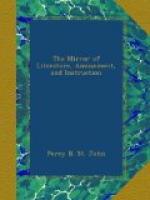* * * * *
Notes of a Reader
* * * * *
HERODOTUS.
Perhaps few persons are aware how often they imitate this great historian. Thus, says the Edinburgh Review, “Children and servants are remarkably Herodotean in their style of narration. They tell every thing dramatically. Their says hes and says shes are proverbial. Every person who has had to settle their disputes knows that, even when they have no intention to deceive, their reports of conversation always require to be carefully sifted. If an educated man were giving an account of the late change of administration, he would say, ’Lord Goderich resigned; and the king, in consequence, sent for the Duke of Wellington.’ A porter tells the story as if he had been behind the curtains of the royal bed at Windsor: ’So Lord Goderich says, ’I cannot manage this business; I must go out.’ So the king, says he, ’Well, then, I must send for the Duke of Wellington—that’s all.’ This is in the very manner of the father of history.”
* * * * *
SPLENDOUR OF THE CHURCH OF ROME.
“In the days of her power and importance, the church of Rome numbered amongst her vassals and servants the most renowned spirits of the earth. She called them from obscurity to fame, and to all who laboured to spread and sustain her influence, she became a benefactress. Her wealth was immense, for she drew her revenue from the fear or superstition of man, and her spirit was as magnificent as her power. The cathedrals which she every where reared are yet the wonders of Europe for their beauty and extent; and in her golden days, the priests who held rule within them were, in wealth and strength, little less than princes. For a time her treasure was wisely and munificently expended; and the works she wrought, and the good deeds she performed, are her honour and our shame. She spread a table to the hungry; she gave lodgings to the houseless; welcomed the wanderer; and rich and poor, and learned and illiterate, alike received shelter and hospitality. Under her roof the scholar completed his education; the historian sought and found the materials for his history; the minstrel chanted lays of mingled piety and love for his loaf and raiment; the sculptor carved in wood, or cast in silver, some popular saint; and the painter gave the immortality of his colours to some new legend or miracle.”—All who have visited the cathedrals and churches of the continent, or who have studied their history at home, must acknowledge the truth and force of these excellent observations. They are copied from an ably-written article on the History of Italian Painting, in the second number of the Foreign Review.
* * * * *
Frederick the Great, in a letter to Voltaire, says, “I look on men as a herd of deer in a great man’s park, whose only business is to people the enclosures.”—This is one of the great men of history.




